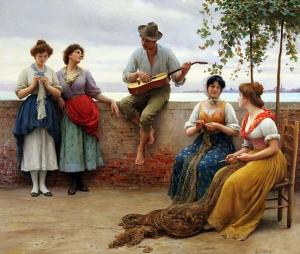Margery (Gred): A Tale of Old Nuremberg (Complete)
Nonfiction, Religion & Spirituality, New Age, History, Fiction & Literature| Author: | Georg Ebers | ISBN: | 9781465606518 |
| Publisher: | Library of Alexandria | Publication: | March 8, 2015 |
| Imprint: | Language: | English |
| Author: | Georg Ebers |
| ISBN: | 9781465606518 |
| Publisher: | Library of Alexandria |
| Publication: | March 8, 2015 |
| Imprint: | |
| Language: | English |
I, MARGERY SCHOPPER, was born in the year of our Lord 1404, on the Tuesday after Palm Sunday. My uncle Christan Pfinzing of the Burg, a widower whose wife had been a Schopper, held me at the font. My father, God have his soul, was Franz Schopper, known as Franz the Singer. He died in the night of the Monday after Laetare Sunday in 1404, and his wife my mother, God rest her, whose name was Christine, was born a Behaim; she had brought him my two brothers Herdegen and Kunz, and she died on the eve of Saint Catharine's day 1404; so that I lost my mother while I was but a babe, and God dealt hardly with me also in taking my father to Himself in His mercy, before I ever saw the light. Instead of a loving father, such as other children have, I had only a grave in the churchyard, and the good report of him given by such as had known him; and by their account he must have been a right merry and lovable soul, and a good man of business both in his own affairs and in those pertaining to the city. He was called "the Singer" because, even when he was a member of the town-council, he could sing sweetly and worthily to the lute. This art he learned in Lombardy, where he had been living at Padua to study the law there; and they say that among those outlandish folk his music brought him a rich reward in the love of the Italian ladies and damsels. He was a well-favored man, of goodly stature and pleasing to look upon, as my brother Herdegen his oldest son bears witness, since it is commonly said that he is the living image of his blessed father; and I, who am now an old woman, may freely confess that I have seldom seen a man whose blue eyes shone more brightly beneath his brow, or whose golden hair curled thicker over his neck and shoulders than my brother's in the high day of his happy youth. He was born at Eastertide, and the Almighty blessed him with a happy temper such as he bestows only on a Sunday-child. He, too, was skilled in the art of singing, and as my other brother, my playmate Kunz, had also a liking for music and song, there was ever a piping and playing in our orphaned and motherless house, as if it were a nest of mirthful grasshoppers, and more childlike gladness and happy merriment reigned there than in many another house that rejoices in the presence of father and mother. And I have ever been truly thankful to the Almighty that it was so; for as I have often seen, the life of children who lack a mother's love is like a day when the sun is hidden by storm-clouds. But the merciful God, who laid his hand on our mother's heart, filled that of another woman with a treasure of love towards me and my brothers.
I, MARGERY SCHOPPER, was born in the year of our Lord 1404, on the Tuesday after Palm Sunday. My uncle Christan Pfinzing of the Burg, a widower whose wife had been a Schopper, held me at the font. My father, God have his soul, was Franz Schopper, known as Franz the Singer. He died in the night of the Monday after Laetare Sunday in 1404, and his wife my mother, God rest her, whose name was Christine, was born a Behaim; she had brought him my two brothers Herdegen and Kunz, and she died on the eve of Saint Catharine's day 1404; so that I lost my mother while I was but a babe, and God dealt hardly with me also in taking my father to Himself in His mercy, before I ever saw the light. Instead of a loving father, such as other children have, I had only a grave in the churchyard, and the good report of him given by such as had known him; and by their account he must have been a right merry and lovable soul, and a good man of business both in his own affairs and in those pertaining to the city. He was called "the Singer" because, even when he was a member of the town-council, he could sing sweetly and worthily to the lute. This art he learned in Lombardy, where he had been living at Padua to study the law there; and they say that among those outlandish folk his music brought him a rich reward in the love of the Italian ladies and damsels. He was a well-favored man, of goodly stature and pleasing to look upon, as my brother Herdegen his oldest son bears witness, since it is commonly said that he is the living image of his blessed father; and I, who am now an old woman, may freely confess that I have seldom seen a man whose blue eyes shone more brightly beneath his brow, or whose golden hair curled thicker over his neck and shoulders than my brother's in the high day of his happy youth. He was born at Eastertide, and the Almighty blessed him with a happy temper such as he bestows only on a Sunday-child. He, too, was skilled in the art of singing, and as my other brother, my playmate Kunz, had also a liking for music and song, there was ever a piping and playing in our orphaned and motherless house, as if it were a nest of mirthful grasshoppers, and more childlike gladness and happy merriment reigned there than in many another house that rejoices in the presence of father and mother. And I have ever been truly thankful to the Almighty that it was so; for as I have often seen, the life of children who lack a mother's love is like a day when the sun is hidden by storm-clouds. But the merciful God, who laid his hand on our mother's heart, filled that of another woman with a treasure of love towards me and my brothers.















